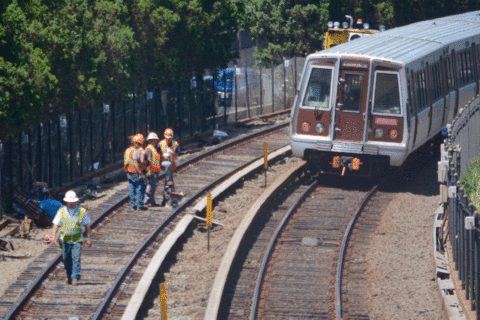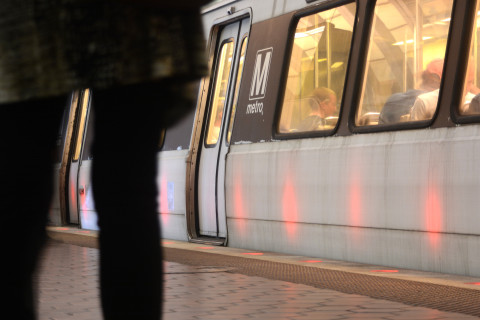WASHINGTON — Metro managers are leaning on workers to let trains run on potentially dangerous tracks and are allowing contractors to work extremely long shifts, members of Metro’s largest union say in statements set to be read to the Metro board of directors Thursday.
“If I, as a front-line employee, am not willing to say the track is safe, and it’s not ready to have regular train service running on it, managers shouldn’t pressure me to say it is. But they do. WMATA is terrified of pissing the public off, but I’m more concerned with making sure they don’t die! The public will get over being mad — they can’t get over dying,” Antonio Ross’s prepared statement read. He has worked at Metro for seven years.
Amalgamated Transit Union Local 689 provided excerpts from the prepared remarks ahead of Thursday afternoon’s board meeting, during which several union members plan to make statements during the public comment period.
Several of the union statements to be made Thursday ask for more coordination between Metro managers and workers out on the trains or tracks every day.
General Manager Paul Wiedefeld told reporters Wednesday that a disconnect between front-line workers and upper management is common in the transportation industry, and he continues to attempt to address the problem at Metro.
“It’s not there yet, but it is the key … it’s about recreating that organizational pride and that means communication, it means listening, it means taking ideas, but it’s also letting people know why you made decisions,” Wiedefeld said.
Documents prepared for Metro board committee hearings Thursday indicate that top Metro management believe tougher discipline is one way to ensure workers stay focused on the job, in this case regarding trains repeatedly running red signals.
“Mr. Wiedefeld, if you believe threatening and scaring employees into doing the right thing is the best way to manage this system, then you will never have a workforce that trusts you or anyone in management,” Ross’s remarks read.
In a blog post Wednesday marking one year of federal safety oversight for the system, acting Federal Transit Administrator Carolyn Flowers wrote that “for all the safety improvements WMATA has made, it remains a long and difficult task to instill the strong safety culture that is required for true and lasting change.”
The post cited achievements including the fact that — for the first time since 2012 — all rail traffic controllers have now completed annual certifications. There have still been communications problems between the troubled Rail Operations Control Center and other Metro workers, but some FTA inspections have noted improvements.
There has also been increased safety training for nearly 2,000 of the Metro workers whose jobs bring them onto or near the tracks, and whose certifications had expired.
That did not keep federal inspectors from nearly getting run over by a speeding train last week.
There have been separate safety problems tied to failed inspections by undertrained or understaffed teams, and a train operator even walked off an out-of-service train this weekend, as first reported by NBC Washington. That incident is under investigation.
A 10-year veteran Metro worker, Alan Young, cites a lack of training opportunities as another key issue.
“They rush us through training, if we’re able to go to an actual class. Sometimes all we have is a PDF document or a packet of papers that they make us sign for at the end saying you understand. Most people feel embarrassed and just sign it,” his remarks read.
Federal inspection reports show many training classes, even during so-called “safety stand downs,” may only have a handful of workers in attendance.
The union, which is currently in negotiations over a new contract, is also set to express concerns about Metro buying equipment that either does not work well or does not get used.
“Mr. Wiedefeld, we are asking you to stop this madness. We’re tired of being overlooked especially when it comes to our knowledge of the system. WMATA management spends millions of taxpayer dollars on ‘contractors and experts’ without acknowledging that our experience has made us experts on this system,” Gavin Pitt, an equipment operator with 28 years of experience, is set to say.
Other concerns from the union include contractors working too many hours in round-the-clock track-work zones. While the Federal Transit Administration has expressed concerns about Metro employees working 12 hours a day, up to six days per week, because of the risk that fatigue could cause serious safety issues, the union says there are even fewer policies in place to address fatigue of contractors.
One worker is set to tell the Metro board that some contractors may be working 7 days a week or 20 hours per day.
Metro’s round-the-clock track work plan leader Laura Mason told WTOP last week that Metro believes its workers are striking the right balance between getting work done and getting time off. There is no 24/7 track work Thursday or Friday this week, after six weeks of Orange Line work wrapped up Wednesday and before Red Line work begins Saturday.







